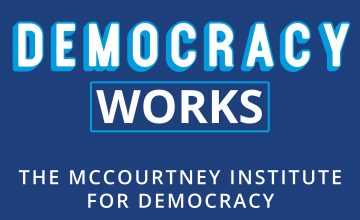Podcast: Play in new window | Download | Embed
Subscribe: Apple Podcasts | Spotify | Email | TuneIn | RSS | More

By now, you’ve no doubt head all about the report issued by Special Counsel Robert Mueller and the drama in Washington that’s ensued in the time since its release. But, if you only focus on the information about collusion and obstruction in the Trump administration, you are missing a whole other part of the story about Russian interference in democracy leading up to the 2016 election. Laura Rosenberger and her colleagues at the bipartisan Alliance for Securing Democracy have been working to raise awareness about this threat since the 2016 election.
Laura joins us this week to discuss what she learned from the report, and where the efforts to combat Russian interference stand. She is our first repeat guest on the podcast. We last spoke with her in the fall of 2018, just before the midterm elections, during a live event at the National Press Club.
Additional Information
Alliance for Securing Democracy
Our conversation with Laura in fall 2018
Discussion/Reflection Questions
- Whose should be taking the lead on combating Russian interference in our democracy?
- What role does the government have to play? Social media platforms? Everyday citizens?
- Do you think that Russian interference will influence the outcome of the 2020 presidential election?
Interview Highlights
[5:15] What did you learn from the Mueller report?
I think it is one of the most important things to remember is that Special Counsel Mueller was appointed to investigate a number of different things. One of them was Russia’s interference in the 2016 election. We learned through the course of his investigation, including through some indictments that he brought against Russian officials and entities, some of what he was finding, but the report definitely added to that. In many ways, I would say his report and the investigation that he led really built on what we found and saw from the findings of the intelligence community and its own assessment of the Russian interference operations, as well as investigations by a number of bipartisan committees in Congress.
[9:58] Are you seeing any evidence that calls to respond to Russian interference are being heeded?
I think we have seen some incremental steps. I think that maybe we are in a slightly better position than we were in 2016, but I think that we have a whole lot of progress that we still need to make if we’re actually going to better protect our democracy against the threats that we face. I think the social media companies need to do a whole lot more to take this issue on in a very systemic way, really going after the root of the problem. I worry right now that some of the approach is too focused on eliminating what they’ve dubbed harmful content.
[11:35] Who do you see as your allies in these efforts?
I think there’s a lot of really great folks out there trying to work on different components of this problem. One of them, there’s a really robust community of researchers that have been taking on this problem and trying to better understand it and provide information. I think transparency and exposing these kinds of operations is one of the really important things that we can do to help combat them.
[14:20] Did we see any changes in election security between 2016 and the 2018 midterms?
We definitely have seen some steps being taken around the midterm elections, including better information sharing between the federal government and state and local officials, getting more information to those officials to be able to ensure that they understand the threat picture, getting a little bit more funding to them, although the funding that was given to them was really for addressing existing vulnerabilities even before the Russian attempts were made.
One of the things, though, that’s really concerning to me is in the wake of the Mueller Report, one of the things that he had in there that was new was talking about a county in Florida that had it’s networks penetrated by Russian cyber hackers. In the wake of that, there’s been a big dispute between the federal government and the state of Florida about whether that was true, whether there was evidence of that, claims that the FBI hadn’t shared what they needed.
[19:29] What changes do you think we’re most likely to see between now and the 2020 election?
Since 2014 we’ve basically seen an ongoing effort by the Russians that has had different chapters at different times. Sometimes targeting different elections and different election cycles, sometimes targeting different issues that are highly divisive in the media. It’s important to understand that these operations are ongoing and they evolve at different points in time. Some of the things that I’m worried about that we might see in terms of evolution targeting the 2020 elections, first is we’ve seen the Internet Research Agency getting even better at insinuating itself to different activist groups. We are a very fertile target surface for our adversaries to take aim at. I think that we’ve got to really turn that table around to ensure that we’re better protected.
[24:01] What would you recommend our listeners do if they are concerned about Russian interference in our democracy?
Voting is something everything can do and it’s also really important for people, as on any other issue, for peoples elected officials to hear from them if this is an issue that they’re concerned about. Dozens of bipartisan pieces of legislation were introduced in the last Congress to address these tactics by the Russians, and we have seen none of them become law. It’s also really important for people to engage in critical thinking on any piece of information. That includes online, and that includes elsewhere. It’s really easy in the political campaign context, when people are very emotional and you’re really trying to make a point, it’s very easy to hook onto something that we agree with, that we think is a really solid thing, even if we don’t know who’s saying it or what their interest or motivations may be, or where the information came from.

